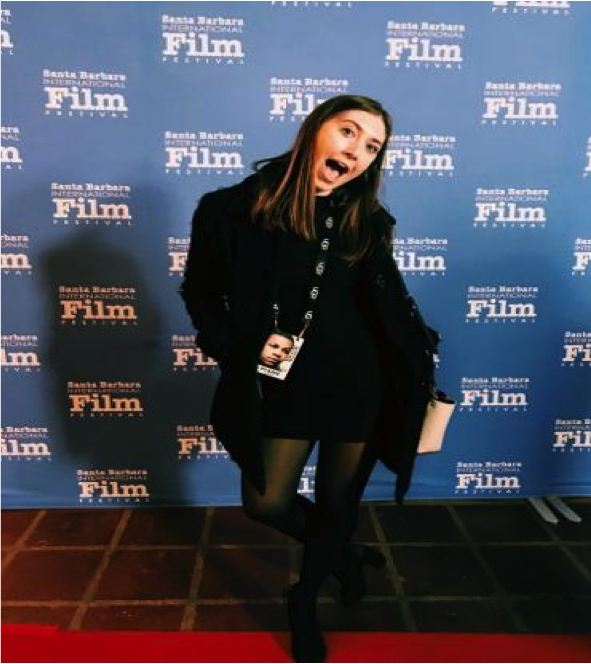By Katie Orr
Ryann Stibor, a fourth-year student at UC Santa Barbara, is combining her passion for film and media with her love of history.
Ryann’s textbooks for this quarter are for both Film and History classes.
After coming into UC Santa Barbara as a history major and then venturing into film classes, Stibor decided in her sophomore year to declare a second major in Film and Media Studies. Stibor’s studies, as well as two consecutive internships with the Santa Barbara Film Festival, have given her insights into the role history plays in various films.
Her interest in studying the history of 20th century America has led her to examine films such as “Forest Gump.” In it, Stibor sees not only the talented work of Tom Hanks, but she also sees how director Robert Zemeckis paints the ‘60s in a political light, showing conflicting opinions of Americans regarding the Vietnam War. Stibor says film allows directors, screenwriters, and actors to represent a specific version of history, such as how Steven Spielberg’s “Saving Private Ryan” captured the dark and violent side of the second World War.
In a recent interview, Stibor pointed out how films like “Black Hawk Down” depicted the Battle of Mogadishu and “Schindler’s List” needed World War II to create its plot line. Directors, she says, rely on history to be a backdrop and to set the scene for their storytelling.
Q. Do you agree that the importance of history is undervalued by today’s generation?
A. Yes and no. I do think that a lot of people don’t understand the broader implications of history. It comes down to the perspective, though, and that’s what needs to change. History isn’t about learning the facts, it’s about understanding the cause and effect, and the Why. People just see it as facts. Yes, in the scheme of things, a specific date about something can be kind of irrelevant, but the general aspect of understanding why things happen is important.
Q. You recently completed your honors contract with history professor Laura Kalman. Could you describe your project? What connection did you make between film and the “great man theory,” in which any man, or hero, has a substantial impact and becomes highly influential in the way history is retold?
A. I was in a lot of film classes so I ended up doing a presentation on the intersection of film and history and drama. I looked at “Forrest Gump,” “The Post,” “All the President’s Men,” and “Mad Men.” I looked at how they created a kind of myth about the ‘60s, but also why film can do this “great man theory” of creating a hero in history, that history tries to not do anymore, and how it makes problems for people who don’t actively learn history. What they do know is what they get through media socialization.
Ryann interned at the 2018 Santa Barbara Film Festival.
Q. What do you hope to accomplish in the future with this double major degree in film and history?
A. After interning at the Santa Barbara Film Festival for two years running, I want to go into television in some capacity. I really love historically rooted TV shows. Being able to work on a show where you do use that history to bolster the show would make it even better. If you look at shows like “Mad Men” and “Outlander,” they are rooted in a period that makes each show so much livelier, but in which an entire episode isn’t culminating in one moment.
Q. What direction do you see the interaction of film and history going toward in the future?
A. One intersection I see is in the dramatic sense. If you think of films that came out this past year, like “First Man,” “The Green Book,” and “Bohemian Rhapsody,” they are true stories and true moments in history. Finding that balance of representing culture or a moment in history that’s interesting is one thing film struggles with. Filmmakers a lot of times aren’t historians and so they will take a lot of liberties creating a false sense of what history was. What’s important is appreciating the history and acknowledging any social liberties taken.
Katie Orr is a third-year student at UC Santa Barbara, majoring in Communication.



